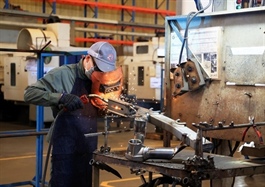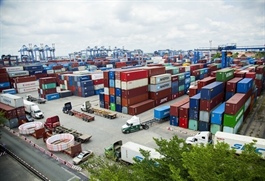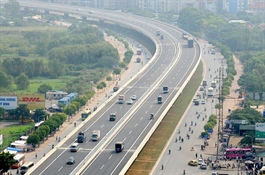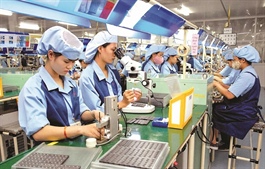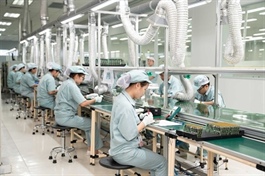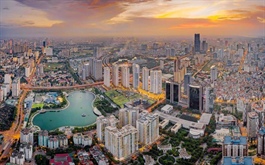Trends set to dictate a robust economy
Trends set to dictate a robust economy
Amidst prevailing economic challenges, businesses and investors find themselves navigating a landscape where opportunities are progressively limited and accompanied by heightened costs.
During last week’s Vietnam Wealth Advisor Summit 2023 in Hanoi, experts assessed that Vietnam is not immune to the intensifying global competitive environment.
Experts agreed that the Fourth Industrial Revolution, characterised by technological advancements, robotics, and automation, has brought about significant transformations in global economic activities. Vietnam, too, is experiencing the effects of these changes.
Nguyen Anh Duong, head of the General Research Department at the Central Institute for Economic Management (CIEM), provided insights into how rapid technological progress has profoundly impacted the global economic recovery and growth.
“Research across ASEAN and East Asia consistently revealed that automation and the strategic utilisation of technology, particularly AI, can effectively facilitate the reconfiguration of production processes and the redistribution of the workforce across economies,” Duong said. “Simultaneously, it spurs trade and service activities grounded in technology.”
Providing an example, in 2021, the CIEM initiated a collaborative agreement with Thailand to enable retailers to employ QR codes for payments. As a result, Vietnamese consumers visiting Thailand can now transact in VND at over eight million payment points accepting QR codes.
Delving into the adverse repercussions of the global technological transition, Nguyen Ba Hung, principal country economist at the Asian Development Bank in Vietnam noted that, given the ongoing competition with China, the United States and numerous European nations are striving for greater self-sufficiency in the electronic production chain.
“Consequently, they have extended subsidies to corporations to establish chip manufacturing facilities within their own territories. The intention of nations to repatriate a substantial portion of the production chain will inevitably affect Vietnam and other countries engaged in the global electronic production network,” Hung said.
On the bright side, experts also shared notable indications regarding the robustness of Vietnam’s economy.
Duong, in reference to the CIEM’s Vietnam Economic Report for the first half of this year, outlined a projection of global economic growth at 3 per cent for the entirety of 2023. This projection notably exceeded the forecasts of several other organisations, which predominantly ranged between 2.1 per cent and 2.8 per cent.
“Many experts initially regarded the 3 per cent growth projection as somewhat implausible. However, the International Monetary Fund (IMF) also unveiled a parallel global economic growth forecast of 3 per cent on July 25,” he said.
Elevated by the favourable global economic growth outlook, the CIEM has formulated three distinct scenarios for Vietnam’s macroeconomics in 2023, envisaging potential GDP growth rates of 5.34, 5.72, and 6.46 per cent.
“We engaged in discussions with the IMF and highlighted the coexistence of perils and prospects within the current economic landscape. Those who adeptly seize opportunities stand to benefit,” Duong emphasised.
Evaluating Vietnam’s international connectivity, Le Xuan Nghia, a banking and financial expert, asserted that due to its pronounced openness to the global arena, Vietnam is primed for a potentially swifter recovery compared to certain counterparts. This is attributable to the nation’s substantial reliance on foreign direct investment, which constitutes one-quarter of GDP and contributes to 70 per cent of industrial output, surpassing the global average.
“In a recent study focusing on the worldwide Purchasing Management Index (PMI), we observed a marginal recovery in nearly all countries, indicating a slight increase of one point. This trend extends to Northeast Asia, yet notably, Vietnam experienced an approximate surge of 2.5 points,” Nghia said.
“Our projections suggest that, commencing from the fourth quarter of 2023, Vietnam’s PMI may further improve. Consequently, a moderate economic recovery is envisaged from the concluding quarter of this year to the initial half of the subsequent year.”
Phan Duc Hieu, standing member of the National Assembly Economic Committee, underscored two prevailing trends: the escalating competition and the burgeoning concept of green consumption.
“In the backdrop of a challenging global economic scenario, we are witnessing a surge in competition, not only among enterprises but also export nations. Consequently, even amidst favourable shifts in the global economic landscape, it is imperative to recognise that Vietnamese enterprises cannot inherently reap benefits from these trends,” Hieu said.
Concurrently, the paradigm of green consumption stands as an irreversible trajectory.
“Enterprises that fail to embrace a strategy of ecological transformation aligned with this trend will inevitably lose their competitive edges and a consequent loss of market share,” Hieu said.
Given this context, he assessed that domestic reforms, particularly those related to institutional restructuring, assume heightened significance both in the immediate and long-term perspectives. Nevertheless, certain businesses remain concerned about legal obstacles, underscoring the substantial need for reform and its potential impact.
Dr. Nguyen Dinh Cung, former director of the CIEM, noted that internal reform stands as the pivotal determinant for propelling economic growth and fostering job creation.
“In line with both international precedents and local practices, instances of adversity often serve as potent catalysts for transformative change,” he said.
However, Cung highlighted that despite the multifaceted directives issued by the prime minister and the government, substantive reforms and internal shifts have yet to manifest sufficiently to counterbalance external challenges. He emphasised the necessity of prioritising fiscal policies over monetary ones and, aside from business environment reform, advocated for a resolute enforcement of the VAT refund policy for enterprises accompanied by an extension of the VAT reduction policy, thereby presenting a dual-pronged approach to foster economic vitality.



